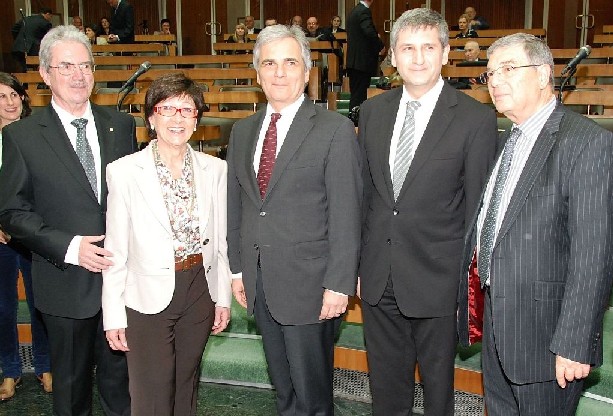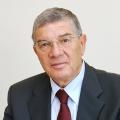
LTR: Guenther and Ulrike Schuster, of the Austrian Friends of Yad Vashem, Austrian Chancellor Werner Faymann, Austrian Vice Chancellor Dr. Michael Spindelegger, Yad Vashem Chairman Avner Shalev
Earlier this week, Yad Vashem Chairman Avner Shalev spoke in the Austrian Parliament, at a special event dedicated to the importance of Holocaust remembrance and education, and to the Austrian Friends of Yad Vashem. Barbara Prammer, President of the National Council of Austria and Honorary Chairperson of the Austrian Friends of Yad Vashem opened the event, which coincided with the anniversary of the Anschluss, a German word meaning connection or annexation that is used to refer to the takeover of Austria by Germany in March 1938. The Chancellor and Vice Chancellor of Austria addressed the gathering, which was attended by members of parliament, the media and the public. Here're Shalev's remarks from the event:
Seventy-four years ago, on March twelfth and thirteenth nineteen thirty-eight, Austria underwent an historic event of great significance: The Anschluss, Austria’s incorporation into Nazi Germany. Many Austrians identified with it and with Nazi ideology.
The Burgenland was the first Austrian state to voluntarily, officially transfer power to the Nazi party. When German forces entered Austria, Burgenland’s towns were already filled with Nazi flags. Its central squares were speedily renamed in honor of Hitler. Within less than a month,Burgenland, like the rest of Austria, voted about Anschluss. One hundred sixty seven thousand seven hundred and seventy five voted for. Sixty-three voted against. Two days later, the first Jews were sent from Burgenland to Dachau. The region’s gauleiter, Tobias Portschy, a Burgenland native, was eager to rule the first Judenrein area in Austria. Thanks to a combination of state directives and violence against the Jews it was reported in October 1938 to Adolf Eichmann in Vienna that all three thousand, six hundred and thirty-two Burgenland Jews were no longer in the Reich.
Tonight we remember and identify with the fate of the Jews of Austria during the Holocaust: The dispossession. The deportations. The extermination.
Despite the historical facts, some still claim that the people of Austria had no choice.
Rosa Schreiber-Freissmuth was one of the few that disprove that claim. Rosa owned the pharmacy in the village of Neuhaus, in Burgenland. Nearby was a camp where Hungarian Jews were forced by the Nazis to dig trenches and build fortifications. In February 1945, Rosa heard a knock at her door. A Jew had escaped in search of medicinefor his dying father. Although an SS man was in her pharmacy, Rosa hid the Jew until danger passed and then gave him medicine and food. She continued to leave food and medicinefor other inmates.
Rosa Schreiber-Freissmuth was an exemplary Austrian. She was willing to put her life at riskon behalf of fellow human beings. But sadly, she was an exception.On March 13th, twenty five years ago, Yad Vashem recognized Rosa Schreiber-Freissmuthas Righteous Among the Nations.
What happened in Austria, over seventy years ago, might be considered merely a distant memory, to be recalled briefly in remembrance rituals. But that would be missing the point - and the opportunity - entirely. As we at Yad Vashem re-discover daily, the Holocaust is much more than history. It did not happen far away, but rather here in Europe, here in Austria.The Shoah is an integral component of contemporary Europe’s heritage and should become part of its consciousness.
Democracy and tolerance are fragile and endangered phenomena – to be constantly guarded and nurtured. Defenders of freedom and human rights must join forces to ensure the future.
Austrians are opening up to this message. During the past eleven years, over four hundred Austrian educators and community leaders have participated in seminars at Yad Vashem.Together with us, they are creating a mutual social vision that approaches challenging realitieswith compassion and humanity. As one of the Austrian participants in a Yad Vashem seminar recently wrote: Here, after two weeks that were the most inspiring of my life, I became a Mensch.
We are inspired in our endeavor by treasured local partners: Our remarkable Austrian Friends of Yad Vashem, a rare group of dedicated, determined volunteers; The National Fund, chaired by Council President Prammer and guided by Hannah Lessing; The Austrian Ministry of Education; The Future Foundation of the Austrian Republic.
Each of these bodies adds its unique contribution to an essential common cause.
In this spirit, following the words of your late President, Thomas Klestil, in the Knesset in Jerusalem, "Anyone who really wants to understand the past, and what must happen in the future to guard against the forces of evil, must face up to historical truth: to the entire truth… Today, we Austrians recognize that an acknowledgement of the full truth is long overdue…Our deeds are, and should be, guided by a sense of remembrance, of awareness and of hope."
As we gather in this impressive place we recommit, to ensuring that your nation’s future reflects that it has learned from its history. The lesson of an open and tolerant society which, like Rosa in that pharmacy during the Holocaust, opens doors to others and is honest about itself. That is a great challenge, which all of us share. Thank you, Shalom and good evening to you all.










